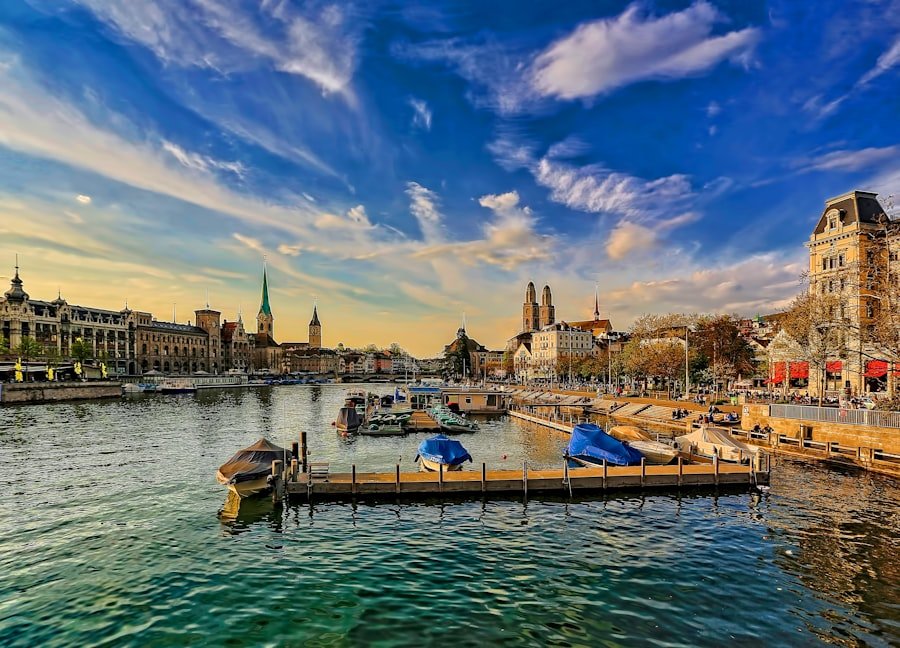Switzerland is a unique tapestry of cultures and languages, reflecting its rich history and diverse population. The country has four official languages: German, French, Italian, and Romansh. Each language corresponds to different regions, with German being predominant in the central and northern parts, French in the west, Italian in the south, and Romansh, a Romance language, primarily spoken in the canton of Graubünden. (Note: Romansh is official at the federal level for communication with Romansh speakers.)
This linguistic diversity is not merely a reflection of geographical boundaries but also a testament to the cultural identities that thrive within Switzerland. The coexistence of these languages has fostered a multilingual society where code-switching and language blending are common. For instance, in urban areas like Zurich or Geneva, one might hear a mix of German and English or French and Italian, as residents navigate their daily lives.
This linguistic fluidity is indicative of Switzerland’s commitment to multiculturalism and inclusivity. Understanding the languages spoken in Switzerland is essential for anyone looking to immerse themselves in Swiss culture, whether for travel, business, or personal enrichment.
Key Takeaways
- Swiss languages include German, French, Italian, and Romansh, with German being the most widely spoken. FSO
- Common greetings in Switzerland include “Guten Tag” (Good day) and “Grüezi” (Hello), with polite expressions such as “Bitte” (Please) and “Danke” (Thank you).
- When asking for directions in Switzerland, it’s helpful to use phrases like “Entschuldigung, wo ist…?” (Excuse me, where is…?) and “Können Sie mir helfen?” (Can you help me?).
- Ordering food and drinks in Switzerland can be done using phrases like “Ich hätte gerne…” (I would like…) and “Die Rechnung, bitte” (The bill, please).
- When shopping in Switzerland, prices are usually fixed; polite negotiation is uncommon outside markets and small independent shops. If attempting, use respectful phrases. moneyland.ch, 2019
Greetings and Polite Expressions
In Switzerland, greetings vary significantly depending on the region and the language spoken. In German-speaking areas, a simple “Grüezi” (hello) is commonly used, while in French-speaking regions, “Bonjour” serves as a standard greeting. In Italian-speaking areas, one would say “Buongiorno”. The choice of greeting can set the tone for an interaction, making it crucial to use the appropriate expression based on the local language.
Politeness is deeply ingrained in Swiss culture, and using polite expressions can greatly enhance social interactions. Phrases such as “Bitte” (please) and “Danke” (thank you) are essential in everyday conversations. In more formal settings, one might use “Herr” (Mr.) or “Frau” (Mrs.) followed by the person’s last name to show respect.
Additionally, when addressing someone for the first time or in a formal context, using “Sie” (you) instead of the informal “du” is customary. This level of politeness reflects the Swiss value placed on respect and consideration for others.
Asking for Directions

Navigating through Switzerland can be an adventure in itself, especially given its picturesque landscapes and charming towns. When asking for directions, it is helpful to know some key phrases in the local language. In German-speaking areas, one might say, “Entschuldigung, wo ist…?” (Excuse me, where is…?). In French, you would ask, “Excusez-moi, où est…?” and in Italian, it would be “Scusi, dove si trova…?” These phrases can help you locate essential places such as train stations, restaurants, or tourist attractions. Understanding directional vocabulary is also beneficial. Words like “links” (left), “rechts” (right), “geradeaus” (straight ahead), and “nahe” (near) can help clarify your inquiries.
Additionally, many Swiss people are accustomed to tourists and often speak English; however, making an effort to communicate in the local language can lead to warmer interactions and a more enriching experience. For example, if you ask for directions to a popular landmark like the Zytglogge clock tower in Bern, using local phrases can enhance your engagement with locals who take pride in their city.
Ordering Food and Drinks
| Item | Quantity | Price |
|---|---|---|
| Burger | 3 | 9.99 |
| Pizza | 2 | 15.00 |
| Soda | 4 | 2.50 |
Switzerland is renowned for its culinary delights, from cheese fondue to chocolate. When dining out or ordering food at a café, knowing how to navigate the menu in the local language can significantly enhance your experience. In German-speaking regions, you might start with “Ich hätte gerne…” (I would like…), followed by your order.
In French-speaking areas, you would say “Je voudrais…” and in Italian regions, it would be “Vorrei…”. These phrases not only convey your order but also demonstrate respect for the local culture. Understanding food-related vocabulary is equally important.
Familiarize yourself with common dishes such as “Rösti” (a Swiss potato dish), “Fondue,” and “Raclette.” Additionally, knowing how to ask about ingredients or dietary restrictions can be helpful; for instance, asking “Ist das vegetarisch?” (Is this vegetarian?) or “En contient-il des noix?” (Does it contain nuts?) can ensure that your meal meets your dietary needs. Furthermore, when it comes to drinks, phrases like “Ein Bier bitte” (A beer please) or “Un café s’il vous plaît” (A coffee please) will serve you well in various dining situations.
Shopping and Negotiating Prices
Shopping in Switzerland can be an enjoyable experience due to its high-quality products and unique offerings. Whether you’re exploring local markets or high-end boutiques, knowing how to communicate effectively can enhance your shopping experience. In German-speaking areas, you might start with “Wie viel kostet das?” (How much does this cost?), while in French you would ask “Combien ça coûte?” and in Italian it would be “Quanto costa?”.
Note: Prices are typically fixed in Switzerland; haggling is uncommon in regular shops and chains. Polite negotiation, if any, is more appropriate at markets or independent stores and is not guaranteed. moneyland.ch survey, 2019. If you do try, phrases like “Könnte ich einen Rabatt bekommen?” (Could I get a discount?) in German or “Pourriez-vous me faire un prix?” in French may be used respectfully.
Emergency Phrases

In any travel situation, being prepared for emergencies is crucial. Knowing how to communicate effectively during such times can make a significant difference. Essential phrases include “Hilfe!” (Help!) in German-speaking areas or “Au secours!” in French regions.
If you find yourself needing medical assistance, saying “Ich brauche einen Arzt” (I need a doctor) or “J’ai besoin d’un médecin” can alert others to your situation. Additionally, understanding how to contact emergency services is vital. In Switzerland, the emergency number for police is 117, for fire services it’s 118, and for medical emergencies it’s 144. You can also dial 112 (European emergency number). Switzerland Tourism
Familiarizing yourself with these numbers and knowing how to articulate your needs can provide peace of mind while traveling. For instance, if you encounter an accident or witness someone in distress, being able to communicate clearly can facilitate a quicker response from authorities.
Numbers and Counting
Numbers play a fundamental role in daily life, from shopping to navigating public transport. Familiarizing yourself with numbers in the local language can greatly enhance your ability to interact with locals and manage everyday tasks. In German-speaking regions, numbers from one to ten are: eins (1), zwei (2), drei (3), vier (4), fünf (5), sechs (6), sieben (7), acht (8), neun (9), zehn (10).
In French: un (1), deux (2), trois (3), quatre (4), cinq (5), six (6), sept (7), huit (8), neuf (9), dix (10). In Italian: uno (1), due (2), tre (3), quattro (4), cinque (5), sei (6), sette (7), otto (8), nove (9), dieci (10). Beyond basic counting, understanding larger numbers is also beneficial.
For example, knowing how to express quantities when shopping or discussing prices can prevent misunderstandings. In addition to basic numerals, learning how to articulate prices—such as “Das kostet zwanzig Franken” (That costs twenty francs) or “C’est vingt francs” in French—can facilitate smoother transactions. Mastering numbers will not only aid in practical situations but also enrich your overall experience while navigating through Switzerland.
Time and Dates
Understanding how to express time and dates is essential for planning activities during your stay in Switzerland. In German-speaking areas, one might ask “Wie spät ist es?” (What time is it?), while in French it would be “Quelle heure est-il?” and in Italian “Che ore sono?”. Knowing how to tell time accurately will help you manage your schedule effectively.
When discussing dates, phrases like “Heute ist der erste Oktober” (Today is October first) or “Nous sommes le premier octobre” in French are useful for making plans or reservations. Additionally, understanding how to express days of the week—Montag (Monday), Dienstag (Tuesday) in German; Lundi (Monday), Mardi (Tuesday) in French; Lunedì (Monday), Martedì (Tuesday) in Italian—will assist you in organizing your itinerary. Being able to communicate about time and dates will ensure that you make the most of your visit.
Transportation Phrases
Switzerland boasts an efficient public transportation system that includes trains, trams, buses, and boats. Familiarizing yourself with transportation-related phrases can make navigating this system much easier. When purchasing tickets or asking for information at a train station, phrases like “Ein Ticket nach Zürich bitte” (A ticket to Zurich please) in German or “Un billet pour Zurich s’il vous plaît” in French are essential.
Additionally, understanding key vocabulary related to transportation will enhance your travel experience. Terms such as “Bahnhof” (train station) in German or “gare” in French are crucial when seeking directions or information about schedules. Knowing how to inquire about departure times—“Wann fährt der Zug nach Bern?” (When does the train to Bern leave?)—can help ensure that you catch your desired connections without unnecessary delays.
Cultural Etiquette and Customs
Switzerland’s cultural etiquette is shaped by its diverse linguistic regions and traditions. Respecting local customs is vital for fostering positive interactions with Swiss residents. For instance, punctuality is highly valued; arriving on time for appointments or social gatherings is seen as a sign of respect.
In business settings, addressing individuals formally until invited to use their first names reflects professionalism. Dining etiquette also plays a significant role in Swiss culture. When invited to someone’s home for dinner, it is customary to bring a small gift such as flowers or chocolates as a token of appreciation.
During meals, keeping hands on the table but not elbows is considered polite; additionally, waiting for everyone to be served before starting to eat demonstrates good manners. Understanding these cultural nuances will not only enhance your interactions but also deepen your appreciation for Swiss traditions.
Useful Swiss Slang and Colloquial Expressions
In addition to formal language skills, familiarizing yourself with Swiss slang can enrich your interactions with locals and provide insight into everyday life. Each linguistic region has its own colloquial expressions that reflect local culture and humor. For example, in Swiss German, the phrase “Chuchichäschtli” refers humorously to a kitchen cupboard but often serves as a tongue-twister for non-native speakers trying to master Swiss pronunciation.
In French-speaking areas of Switzerland, expressions like “C’est pas possible!” convey disbelief or surprise in a light-hearted manner. Similarly, Italians might use “Che figata!” to express excitement about something cool or impressive. Understanding these colloquial expressions not only enhances communication but also allows travelers to connect more authentically with locals by engaging with their language on a more personal level.
By immersing yourself in the languages spoken across Switzerland—from greetings and polite expressions to emergency phrases and cultural etiquette—you will not only navigate daily life more effectively but also gain a deeper appreciation for the rich tapestry of Swiss culture that these languages represent.
If you are planning a trip to Switzerland, it is important to be aware of the country’s multilingualism. Switzerland has four official languages: German, French, Italian, and Romansh. This diversity can be both fascinating and confusing for travelers, so it is helpful to learn some basic phrases in each language before your trip. For more information on language in Switzerland, check out this official overview from the Swiss authorities.
FAQs
What are the official languages of Switzerland?
Switzerland has four official languages: German, French, Italian, and Romansh. Federal Dept. of Foreign Affairs, 2024-06-20
Which language is most commonly spoken in Switzerland?
German is the most commonly spoken as a main language (about 62%). FSO, 2022-01-24 (2020 data)
Do people in Switzerland speak English?
Yes, many people in Switzerland speak English, especially in tourist areas and larger cities. However, it is always helpful to learn a few basic phrases in the local language.
Is it necessary to speak the local language when visiting Switzerland?
It is not necessary to speak the local language when visiting Switzerland, as many people speak English. However, making an effort to learn a few basic phrases in the local language can be appreciated by the locals.
Are there any language differences between different regions of Switzerland?
Yes, there are language differences between different regions of Switzerland. The language spoken in each region is influenced by the country’s four official languages, with German being predominant in the central and eastern regions, French in the western region, Italian in the southern region, and Romansh in some parts of the southeastern region.
Can I get by with just English in Switzerland?
Yes, it is possible to get by with just English in Switzerland, especially in tourist areas and larger cities. However, learning a few basic phrases in the local language can enhance your travel experience.
Updated 2025-09-29
Sources: Federal Statistical Office (FSO) · Switzerland Tourism · Federal Chancellery on Romansh

